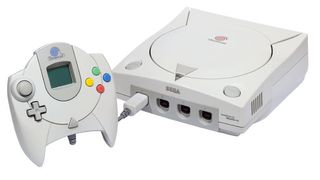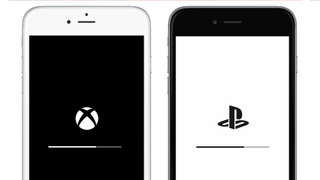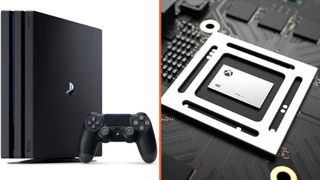Once upon a time, video game consoles produced by the major competitors were released to the public at roughly the same pace, with each new console representing a massive jump forward in processing power and graphical fidelity. While many of us can still clearly remember the days when that was true, tell that story in 20 years and the "once upon a time" bit won't just be a cutesy phrase - it'll be the introduction to what really will sound like a fairy tale.
Three years into their lifespans, Sony and Microsoft have already announced the would-be successors to the PS4 and Xbox One, the PS4 Pro and Scorpio. These new (or in the case of Scorpio, upcoming) consoles represent incremental steps of technical upgrades where previous generations made leaps. These "mid-generation refresher" consoles were a defining topic of 2016, and as we look ahead to 2017, expect them to become a trend.
These consoles are the first step toward a vastly more complex and varied future when it comes to deciding what machine will sit under your TV. But this isn't really that new or radical of an idea. In fact, you only need to look back as far as the Sega Dreamcast to see the genesis (no pun intended) of the mindset that's driving these half-gen updates.

The idea of expanding or extending a player's time with a game existed in various forms far before the Dreamcast via expansion packs and the like - or, going even further back in time, books like the D&D Monster Manual. But Sega's ill-fated platform was the first to incorporate an internet connection as a standard feature, and it took advantage of this by offering what we now call DLC.
By connecting their console to the internet, players could, for example, download a Dreamcast launch day celebration package for Sonic Adventure. This added posters and balloons around the hub area of the game, each one containing special messages of thanks and encouraging users to stay tuned for more fun. Exceedingly simple by today's standards, but first steps often are.
As the internet grew in its capabilities, so did our machines. The original Xbox offered content far more sophisticated than the Dreamcast was capable of, such as maps for Halo 2 and extra missions for Splinter Cell, while also setting up the Xbox Live service. The Xbox 360 expanded on this, dedicating an entire section of its interface to digital content obtained via Xbox Live.
But regardless of who made the service or the complexity of what it offered, the intent was the same: make games a living experience to keep players coming back.

You've probably heard the phrase "games as a service" - this is what that means; to take games from being something you conquer and complete to something you use, something you subscribe to. We've seen this mentality grow from the aforementioned celebratory posters to offering horse armor to signing up for season passes and early access. For better or worse, many games these days are no longer one-and-done affairs. The PS4 Pro and Scorpio are merely an extension of this philosophy into the hardware space.
Think about it this way: if you're a hardcore Call of Duty fan, you're not just going to play it on launch week; you're going to come back week after week, month after month, buying and playing through the drip-feed of DLC. And once you're done, a new Call of Duty game arrives to bring you back to the beginning of a new cycle. While some players out there are happy to split their time between multiple shooters, many more will pick one and stick with it. So as long as their chosen franchise has new content being pumped into it, they ignore the competition.
Some have made comparisons between development of the PS4 Pro and Scorpio and the development of cell phones. It's a very apt observation, and not just because we may eventually be looking at a plethora of consoles of varying power all on the market at the same time. In fact, if there is one thing I can drive home about this, it's forget about the processing power differences that PS4 Pro and Scorpio achieve. These consoles will not be significant because of the number of pixels they can push, but because of the ecosystems they bring users into, just like cell phone plans.
If you've ever gone from using an Android to an iPhone or vice versa (or hell, if you've gone from using a Windows Phone to using… anything), you know the frustration that comes from losing your apps. If you've switched carriers, you might have even lost your entire list of contacts. Now imagine losing access to all of your games.

It's something we were used to before, as each new console generation clearly marked the end of one system and the migration to another. But as the lines between generations become blurrier thanks to consoles like the PS4 Pro and Scorpio - and more importantly, the systems that succeed them - that call to migration will be lost.
The Nintendo Switch, which will supercede the Wii U in March 2017, is the last console being positioned as the start of a new generation (at least for Nintendo) that we can see on the horizon. It is, for the moment, an outlier. But if the pace of these refresh consoles continues, don't be surprised if we never see a PS5 or Xbox… whatever name would make sense at this point. Just like the cycle of Call of Duty DLC or the apps you have through iTunes, your hardware will become a never-ending service.
Call of Duty players tend to stick with CoD, iPhone users tend to stay iPhone users, and soon, PlayStation users will have even more of an inclination to stay with Sony, while Xbox users will have more incentive to stick with Microsoft. There will never be a good time to leave, just as there's never a good time to abandon CoD, or a good time to abandon Apple (barring any Ghosts or AirPods-level screw-ups, of course).
The PS4 Pro and Scorpio and the mid-cycle refresh are the first step toward instilling in players a feverish brand loyalty that borders on dependency. Loyal customers are exactly what any good business wants, and make no mistake: the PS4 Pro and Scorpio are all business. If they prove successful, we can look back and say the fairy tale of clearly-defined console generations ended in 2016.


